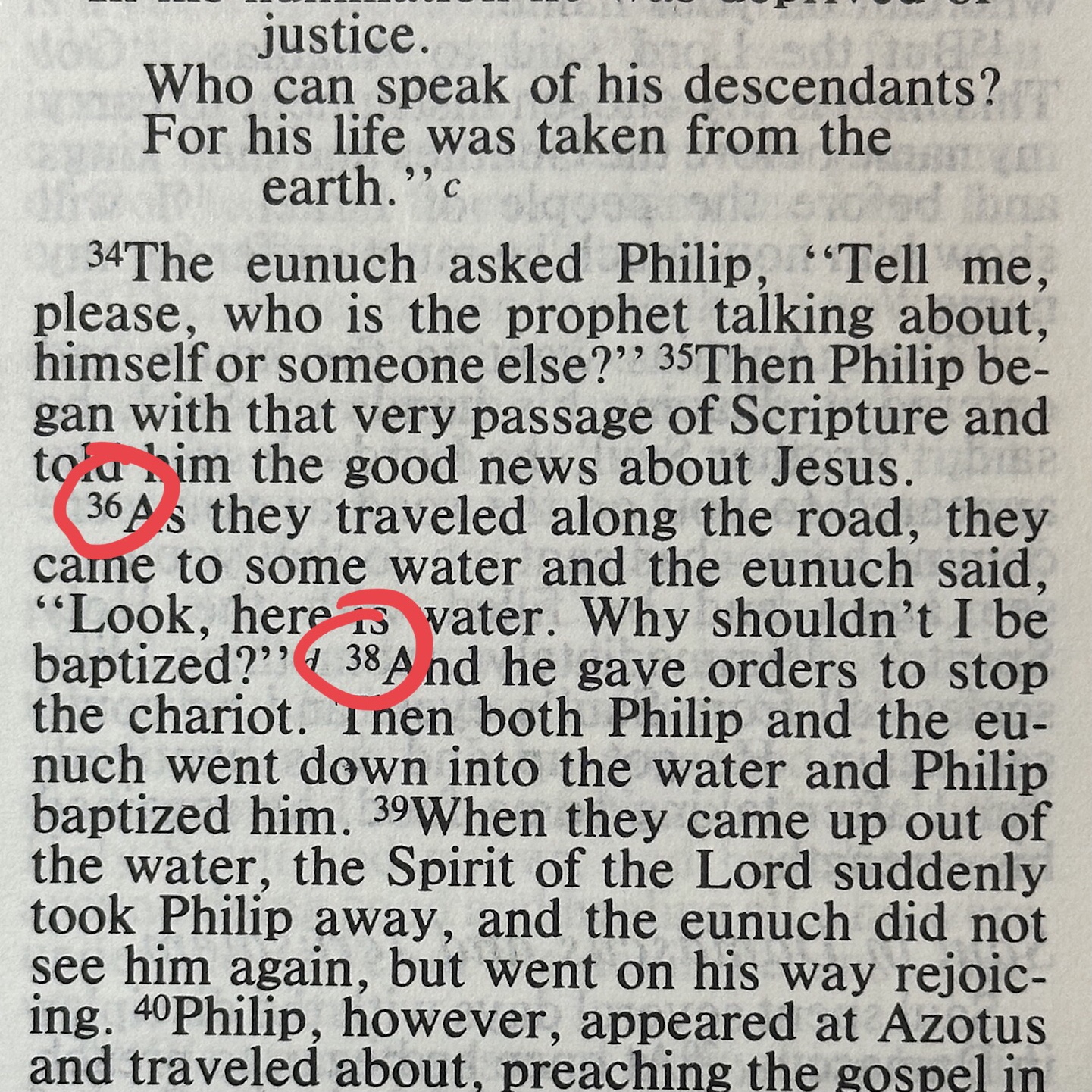Jordyn has been seeking God, but it’s been an up-and-down cycle. She says, “I was researching about missing verses out of the Bible. I was confused and put it aside until I found out about missing books out of the Bible. This has caused me to doubt my beliefs and God…. I don’t want to read my Bible because I feel like that doubtful feeling is just going to sit in me. I want to pray, but that doubtful feeling is there. I feel so hopeless…. All I wanted was to get closer to God, but now I’m questioning the existence of God.”
A RESPONSE FROM RICH KNOPP: Thanks for sharing your comment! You raise several very important issues that may affect others as well. I hope this reply will help give you greater confidence in the Bible and in your faith in God.
First, going through ups and downs in our faith-feelings is quite normal. Even so, sometimes the ups may seem less frequent or less satisfying. But it’s important to be persistent and patient in your prayers, continually asking God’s Spirit to fill you and give you conviction in spite of your doubts. It’s also important to continue reading the Bible in spite of your concerns about possible negative effects. God uses Scripture to enlighten and encourage us. One suggestion is to meditate on Mark 9:14-24 where a father of a very sick boy says to Jesus: “I believe; help my unbelief.” Another helpful passage is Luke 7:11-22. Here, Jesus answers the doubts of John the Baptist by reminding him of the amazing things God is doing through Jesus.
Second, it’s important not to trust your wavering feelings, but to dwell on the wide array of evidence for God and for the truth and reliability of Scripture. Room For Doubt has resources for this. I especially recommend the article, “Help! I Don’t Want to Waste My Life on Something False.” I also suggest reading through some of my “Home Tour” where I offer a variety of considerations for why I’m committed to Christianity—and why I think others should be too.
Third, having periodic doubts about Christianity and what it claims about God and the Bible is fully understandable. The fact is, we cannot know with intellectual certainty that it’s all true. But I would prompt you to confront the alternatives with the same level of questions and doubts. How do the claims of Christianity compare with the claims made by non-Christian religions or philosophies? For more on this, see our article, “Having Major Emotional Doubts About God. I Need To Believe Again.”
Fourth, you mention missing verses and missing books from the Bible and how these have prompted more general doubts. My guess is that you’ve come across passages like Mark 16:9-20 and John 7:53–8:11. Many modern translations (like the NIV and the ESV) note that some ancient manuscripts do not include this material. And these translations sometimes completely leave out Bible verses (like Matt. 17:21; 18:11; Jn. 5:4; and Acts 8:37). You’ve also probably come across information about other ancient books that did not make into the Bible, like the Gospel of Thomas or the Acts of Paul. The typical skeptical claim is that the text in the Bible is not reliable, and the list of books in the Bible is greatly disputable.
However, I want to emphasize that the issues of “missing verses” and “missing books” are not something that should shake your Christian faith. While they may raise questions that are new and troublesome, they can actually (and ironically) strengthen your trust in the reliability and authority of the Bible.
While much can be said on this, I want to highlight a few points:
(1) Regarding so-called “missing books,” early Christians diligently determined which books should be accepted as God-inspired and authoritative (and included in what became the New Testament) and which books should not. (This is the issue of the “canon”—a word that refers to a “rule” or “measuring stick.”) Some of the main considerations were these: (a) Did the book have apostolic connection–that is, was it written by an apostle of Jesus or a close associate? (b) Was the book consistent with the established tradition of apostolic preaching and teaching? and (c) Was the book acknowledged as having authority over the entire church?
It’s helpful to be aware of a basic timeline and circumstances for the collection of books in the New Testament (NT). The 27 books in the NT were originally written between about AD50–AD100. They were individual books that had to be hand copied and slowly distributed around the Greco-Roman world. There were no copy machines, email, or texting! And the direct-flight distance from Jerusalem to Rome was about 1400 miles and much further by land or sea. It’s important to know that most NT books were widely accepted as authoritative before AD200—especially the four gospels, most of Paul’s letters, 1 Peter, and 1 John. Some NT books took longer to disseminate and achieve universal recognition (like 3 John, 2 Peter, and James). As a result, the entire list of 27 NT books was not officially acknowledged until the late AD300s.
While this seems very slow by modern standards, it is understandable and remarkably fast in the ancient Roman empire, especially since Christians faced severe persecution up to the time of Constantine (AD312). A major point is that most of the 27 NT books, which consistently present the core claims of Christianity, were widely accepted as divinely inspired and authoritative in the second century (AD100-200). (For more about this, see the article, “Did Jesus Really Exist? Don’t We Have Untrustworthy Copies of Copies of Copies of the Gospels?”
(2) What about “missing verses” and purportedly problematic passages? It’s true that many modern translations (like the NIV and ESV) note that some ancient manuscripts do not include some verses (like those I mentioned above). The main reason is that we have discovered thousands of ancient Greek NT manuscripts over the last 150 years, many of which are much older than what was available when the King James translation was done in 1611. These manuscripts, when compared with each other, have some differences (or “variants”). Since we don’t have any original writings of any Bible book, these manuscripts allow scholars to determine, with greater confidence, what the original texts of the Bible books said. This process is called “textual criticism.” Based on more complete and better manuscript evidence currently available, modern translations may include a verse in the main text but offer a note about what different ancient manuscripts say, or they may occasionally leave verses out of the text itself (as in the case of Acts 8:37 in the NIV, ESV, and NASB). (Incidentally, the King James translation includes the content of Acts 8:37 in its main text. Also, chapters and verses as used today did not appear in English Bibles until the Geneva Bible in 1560. However, the issue of “missing verses” is not created by the addition of chapters and verses. Textual variants among ancient manuscripts are determined by differences in the content of the manuscripts.)
While this may be confusing and concerning, here are a few big takeaways that should be encouraging.
- Because of the vast manuscript evidence now available, the text of the Bible is more assured today than it ever has been.
- Only two passages in the NT that are longer than two verses seem questionable: Mark 16:9-20 and John 7:53–8:11. The content of the Mark passage (about some appearances of Jesus after the resurrection) also appears in Matthew, Luke, and John. So even if Mark 16:9-20 is disregarded, nothing is really lost. The incident in John 8:1-11 (about the woman caught in adultery) only appears in John, so we don’t have as much manuscript testimony about that event. But even if the John 8 section is disregarded, we would still know from other passages about how the scribes and Pharisees tried to test Jesus (e.g., Matt. 19:3; 22:18; Mk. 10:2) and about Jesus’ desire to forgive rather than to condemn (e.g., Lk. 7:36-50; Jn. 3:17).
- No essential doctrine of Christianity is affected by the manuscript variants or by “missing verses.” It’s estimated that about 70% of the variants among the manuscripts are simply spelling differences–like some ancient manuscripts use two n’s in the Greek word for “John” and other manuscripts use just one n. It’s especially significant that Bart Ehrman, a notable skeptic of Christianity, acknowledges that “the essential Christian beliefs are not affected by textual variants in the manuscript tradition of the New Testament.” (Misquoting Jesus, 2007, Appendix). He also affirms that “the vast majority of these hundreds of thousands of differences are completely and utterly unimportant and insignificant and don’t matter at all. By far the most common differences simply show us that scribes in the ancient world could spell no better than most people can today …. If we really want to know what the apostle Paul had to say about the importance of Jesus’ death and resurrection, does it matter to us how he spelled the word ‘resurrection’? Probably not.” (The New Testament: A Historical Introduction to the Early Christian Writings, 2016, p. 23]).
I hope these considerations and recommended articles can help overcome your doubts about God and give you greater assurance that the God who deeply loves you has reliably communicated his good news in the writings of the Bible. God is there, and he is worth pursuing with prayer, patience, and persistence!





